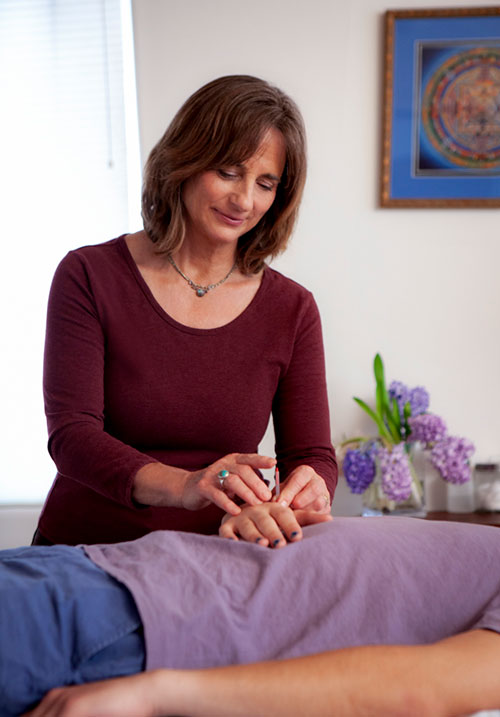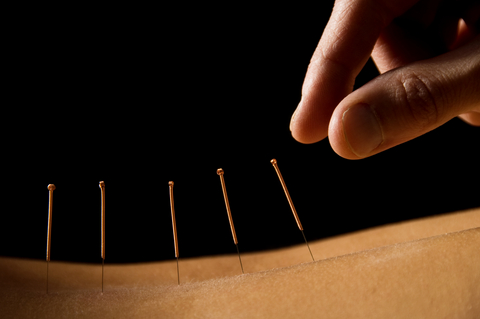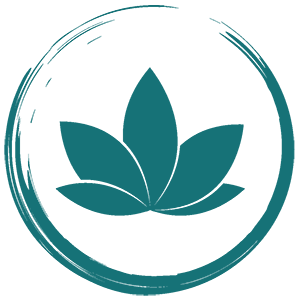Acupuncture
 Acupuncture was developed in China over two thousand years ago. It is presently the fastest growing form of medicine in the modern world. Safe and effective, it is used to alleviate pain and treat a variety of physical, mental and emotional conditions.
Acupuncture was developed in China over two thousand years ago. It is presently the fastest growing form of medicine in the modern world. Safe and effective, it is used to alleviate pain and treat a variety of physical, mental and emotional conditions.
In her acupuncture practice, Lisa focusses on treating the person, not just the disease. Whatever the health challenge, her foremost concern is the patient as a whole and their overall state of health.
By working with the body as a balanced, integrated, unified system, acupuncture can treat multiple concerns and conditions simultaneously.
Acupuncture treatments include a wide range of diagnostic and therapeutic tools. Needle-free options are available. Treatments are individualized to meet patient needs and requests.
Additional therapies used during treatment can include:
BENEFITS
How does acupuncture work?
 Acupuncture works with energy pathways, called meridians. These pathways allow energy to flow, much like an electrical system allows electricity to move through a house. We can think of the meridians as an electrical system that supplies our body with energy, light and warmth. Traditional Chinese Medicine calls this qi. Illness and imbalance occur when our pathways are blocked so that parts of our system are not receiving the qi they need.
Acupuncture works with energy pathways, called meridians. These pathways allow energy to flow, much like an electrical system allows electricity to move through a house. We can think of the meridians as an electrical system that supplies our body with energy, light and warmth. Traditional Chinese Medicine calls this qi. Illness and imbalance occur when our pathways are blocked so that parts of our system are not receiving the qi they need.
We cannot see the electrical current in a house, but we can feel it. The same is true for the energies that flow through our body’s meridians. Acupuncture points along the meridians provide a connection to internal organs, muscles and all physiological functions. These points carry a low-level electrical charge that can be felt and measured.
When the energy current moving through our pathways decreases due to illness or stress, the acupuncture points can be used to open the flow and boost the qi. The result is a revitalization of our overall health and vitality and a return to optimal functioning.
As an acupuncturist, Dr. Wilson’s first job is to diagnosis the body’s blockages and choose the points along the meridians that will open and renew the flow of energy. She then places the thin, sterile acupuncture needles in the specific points that her diagnosis indicates will be most effective. The needles are a means to access the body’s internal physiological processes safely and painlessly.
What conditions can acupuncture treat?
The World Health Organization recognizes over one hundred conditions that acupuncture therapy can treat effectively. The list includes various types of chronic and acute pain, along with many internal conditions that relate to immune function, digestive health, gynecological issues, musculoskeletal and neurological disorders, sleep problems and more.
Do I have to choose between acupuncture and other forms of health care?
No. Acupuncture is often a perfect complement to conventional therapies. Many people seek acupuncture and herbal treatment during the course of other medical interventions. Acupuncture can assist with preparing for and recovering from surgery, radiation, chemotherapy or other medical procedures and medications. Lisa works closely with patients and their other health care providers to ensure that they receive the best care from all possible sources.
What should I expect at my first acupuncture treatment?
Lisa will ask many questions about your past and present health history, including past illnesses, surgeries, medications and life stressors that may have shaped your current health picture.
She will then check your pulse and look at your tongue, as these provide information about your internal physiology.
Next you will receive an acupuncture treatment, which may include some light massage to help relax muscles and facilitate the flow of energy. She may also suggest a Chinese herbal formula and/or give dietary suggestions to support the focus of the treatment.
It is important to come to your appointment well-hydrated and neither too hungry nor too full. Scheduling some downtime after your treatment is also recommended so that your body can assimilate the deep benefits of balance and relaxation.
How many acupuncture treatments do I need?
The number of treatments necessary to clear any condition depends on the severity of the illness and the patient’s overall health. In general, acute conditions require one or two treatments, while chronic health problems often need more.
In addition, Lisa finds that many of her patients continue occasional “tune-up treatments” after their initial pain or illness is gone. This promotes optimal functioning of the body in order to avoid common illnesses. Acupuncture is truly a prevention-based medicine.

